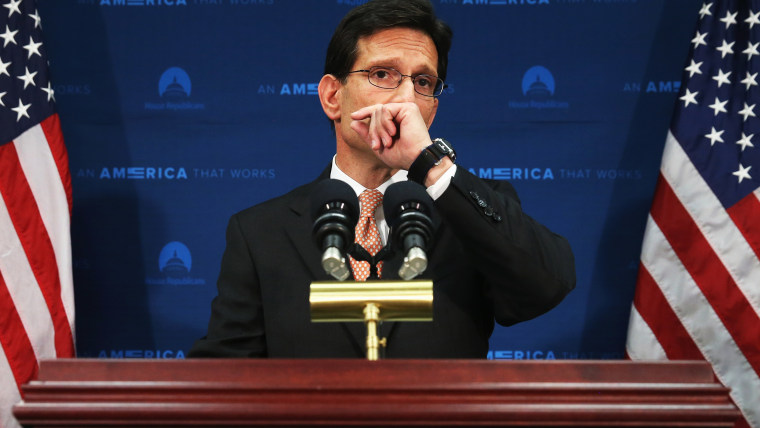After House Majority Leader Eric Cantor's (R-Va.) stunning loss this week, Rep. Trent Franks (R-Ariz.)
shared a theory that explained why the powerful incumbent lost: this is all President Obama's fault.
"[Voters] see the country starting to fray at the seams and they want someone to blame, and unfortunately there's some fratricide in a situation like that," Franks said.
He didn't seem to be kidding. In Franks' mind, Republican voters rejected a Republican congressman in a Republican primary because they're upset about President Obama -- the leader the Republican congress fought at every turn.
When I first saw Franks' argument, I laughed it off, but Jed Lewison
noted that the far-right Arizonan isn't the only one pushing this talking point. Yesterday, House Speaker John Boehner (R-Ohio) tried the same line.
"[Y]ou have to understand, the American people are being squeezed by Obama's policies. The economy is not growing. Incomes aren't growing, we are not creating enough jobs. And two-thirds of America see no increase in our wages, but their food prices are going up. Their gas prices are going up. And their health insurance costs are going up. "And so there is a lot of frustration that's out there. And they look to Washington and wonder why we can't resolve these issues. They are hard to resolve when you've got a president who won't engage."
As far gone as the Speaker is, even Boehner couldn't possibly believe his own propaganda. For one thing, the president does nothing but engage, desperately offering compromises that Republicans slap away.
For another, in what universe do conservative Republicans punish other conservative Republicans as a way to register outrage towards the White House?
As for Team Cantor itself, the congressman's aides have their own ideas to explain Tuesday's results.
Outgoing House Majority Leader Eric Cantor's (R-Va.) campaign manager is pinning the blame on Democrats for his shocking loss. Longtime Cantor adviser Ray Allen, in his first interview since Cantor was stunned by little-known professor Dave Brat (R), told The Hill that he believed Cantor was a victim of meddling from Democrats who crossed over in the primary to vote against him. "We had probably 15,000 card-carrying Democrats come into this primary. There's just no way to anticipate something like that," Allen tells The Hill.
I can appreciate why this might make Cantor and his aides feel better. If 15,000 Democrats engaged in mischief, voting in a GOP primary just to punish the congressman, it would means Cantor's own allies in his own district didn't turn on him; his aides' strategy was otherwise sound; and Cantor's pollster didn't make one of the era's biggest mistakes.
There's just one problem: the argument is fiction. The crossover theory has been subjected to scrutiny
over and
over again, but the evidence just isn't there. The "15,000 card-carrying Democrats" line appears to have been made up entirely.
In any election, it's rarely just one thing that leads to a result. But in Cantor's case, blaming Obama is silly, and blaming imaginary Democratic voters is worse.
